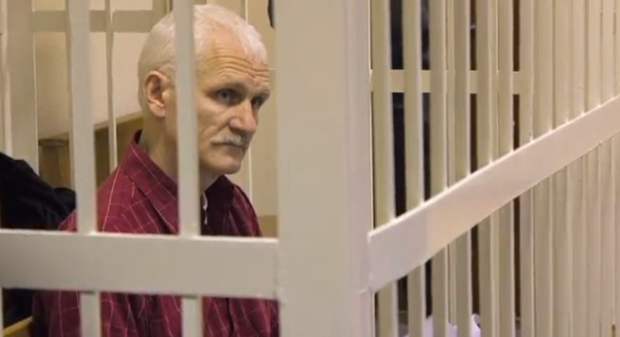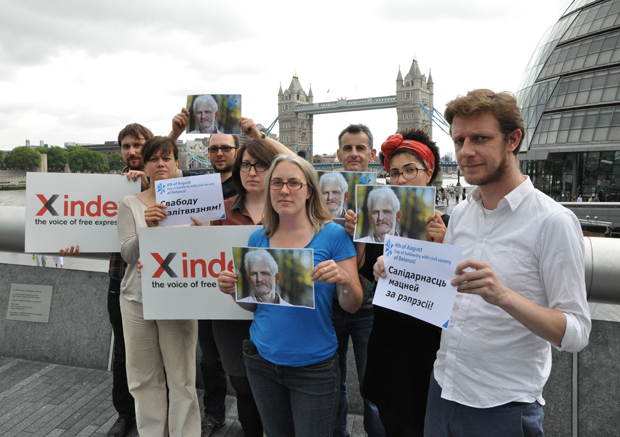21 Jan 2014 | Belarus, Europe and Central Asia, News

Ales Bialiatski has been imprisoned in Belarus since 2011 (Image: AmnistieWeb/YouTube)
Belarusian president Alexander Lukashenko has said in a press conference in Minsk today that human rights defender Ales Bialiatski could be released from prison soon. This came in response to Ales Lipay, editor of BelaPAN news agency, asking about the possibility of amnesty for Bialaitsky, who has been imprisoned since 2011. He is accused of evading taxes on 90,000 US dollars.
“That damage was repaid to the state long ago with citizens’ donations; there were cases in Belarus when business people who faced economic charges were released after repaying much bigger sums. In neighbouring Russia, President Putin released Mikhail Khodorkovsky who was charged with causing the state damage of 500 million US dollars,” Lipay suggested in his question.
“This is a serious argument,” Lukashenko replied. “This has nothing to do with politics or Biliatski’s views. I swear I have never known him personally […], but taxes are a sacred thing.”
According to Lukashenko, if the information about the damage allegedly caused by Bialiatski being repaid is true, amnesty can be considered. He also suggested other political prisoners, like former presidential candidate Mikalay Statkevich, can be released if they apply with a relevant plea for a presidential pardon.
“Lukashenko’s statement shows he thinks about the issue of political prisoners; he definitely aims at solving this problem without any damage to his image as a strong leader,” Tatsiana Raviaka, Bialiatsky’s colleague at the Human Rights Centre Viasna, told Index. “The reason Lukashenko might want to solve it now is reputational as well, because Belarus is hosting the Ice Hockey World Championship in 2014, and looks into ‘clearing’ its record on political prisoners.”
Raviaka says there could be a slight “warming” of the overall human rights situation in Belarus as the authorities tend to “play the liberalisation game a couple of years before the presidential elections.”
“That was the case in 2008, before the severe clampdown came in late 2010; now we can face the same period of relative easing of the situation before the 2015 campaign. I think the firm position of the EU on the release of political prisoners as a pre-condition for any dialogue with the Belarusian authorities has also played its role. Besides, I am sure Lukashenko is following the developments in Ukraine, and he sees that further ‘tightening the screws’ can lead to serious protests,” she adds.
According to Raviaka, it is possible Bialiatski could be released, as “it is entirely the issue of political will”.
Ales Bialiatski is the chair of the Human Rights Centre Viasna, and a vice president of the International Federation for Human Rights. He was arrested on 4 August 2011 and later sentenced to four-and-a-half years in prison. Despite charges of tax evasion, the country’s civil society and the international community see his prison sentence as punishment for his principled stance in support of human rights in Belarus.
This article was posted on 21 January 2014 at indexoncensorship.org
10 Jan 2014 | Belarus, News

Ales Bialiatski has been imprisoned in Belarus since 2011 (Image: AmnistieWeb/YouTube)
According to Belarusian authorities, a book by political prisoner Ales Bialiatski can “damage the image” of the country.
That was confirmed in a recent letter from the Ashmiany regional customs office to Tatsiana Raviaka, Bialiatski’s colleague from Human Rights Centre Viasna. In July 2013 its officers confiscated 40 copies of Bialiatski’s book “Enlightened by Belarus”, as they were being transferred from Lithuania, where they had been published, to Belarus. Now Raviaka has been told to “re-export the copies of the book to Lithuania” as it has been included on a blacklist of goods that are barred from the territory of the Customs Union of Belarus, Russia and Kazakhstan.
The exact reason for including Bialiatski’s book on the list is not mentioned. After it was first inspected, authorities conclude it could “be harmful for the image of the Republic of Belarus”. However, the State Customs Committee of Belarus itself admitted this justification did not match the legal requirements for a ban, and a second inspection was initiated. The results of this are unknown, besides providing ground for banning the book.
“I am sure the real reason for such close attention to the book is the personality of its author,” Tatsiana Raviaka told Index. “Ales Bialiatski is a well-known human rights defender and he serves a prison term at the moment. Several parts of the book were actually written while he was in prison.”
The actual contents of the book may also play a part in the decision to ban it. “Enlightened by Belarus” is a collection of essays on the history of the Belarusian literature. Before joining the human rights movement he was a post-graduate student at the National Academy of Science and a director of Maksim Bahdanovich literature museum in Minsk. Several essays contain critical assessments of literary works by Belarusian political prisoners, like Uladzimir Niakliaeu and Aliaksandr Fiaduta, written behind bars as they had been arrested after protests on 19 December 2010.
“Ales introduced a notion of ‘Belarusian prison literature’. In fact his book points out that for decades writers in Belarus have been persecuted and put in prisons, from the times of the Czar Russia and Soviet repression, to present day,” says Tatsiana Raviaka, adding that the state censors cannot allow free distribution of the views on the literary process presented in Bialiatski’s book. She and her colleagues from Human Rights Centre Viasna are going to appeal the ban.
Ashmiany regional customs office is known for its close attention to “dissent literature.” In April 2013 it confiscated a Belarus Press Photo album, which a court later ruled to be “extremist”.
Ales Bialiatski was arrested on 4 August 2011 and later sentenced to four-and-a-half years in prison. Despite charges of tax evasion, the country’s civil society and the international community see his prison sentence as punishment for his principled stance in support of human rights in Belarus.
2 Aug 2013 | Campaigns

Index joins the International Day of Solidarity with Civil Society of Belarus to be held on 4 August, on the second anniversary of the arrest of a well-known Belarusian human rights defender Ales Bialiatski.
Mike Harris, Head of Advocacy at Index, said:
“Today we send our solidarity and support to Belarusian independent journalists and civil society activists, who continue their courageous work to defend human rights in Belarus. The government of Belarus must immediately and unconditionally release all of its political prisoners. Before the EU engages with Belarus, all political prisoners need to be released and concrete steps taken to remove restrictions that curtail freedom of expression.”
The International Day of Solidarity with Civil Society of Belarus is a joint initiative of NGOs from different countries. It is created as a demonstration of solidarity with civil society of Belarus and of moral support to human rights defenders, journalists and activists, who continue their work in the country dubbed “Europe’s last dictatorship.”
“We will observe this day every year, until the situation of civil society in Belarus changes: until its authorities put an end to imprisoning people for human rights activities, until there is a guarantee of fundamental human rights: freedom of expression, assembly and association,” the Solidarity Day Manifesto reads.
Last year, actions dedicated to the International Day of Solidarity with Civil Society of Belarus were held in 18 countries of the world. This year the organisers call on people around the globe to send letters of support to Belarusian political prisoners and human rights defenders, to publish articles and hold events about the situation in Belarus. A detailed list of possible actions within the framework of the Solidarity Day can be found here.
Ales Bialiatski, a Peace Nobel Prize nominee and a leader of Human Rights Centre Viasna, was arrested 4 August 2011, and currently serving a four-and-a-half year prison sentence for alleged tax evasion. The income on which he was found guilty of not paying taxes had in fact been used to support victims of human rights violations in Belarus.
According to Belarusian human rights defenders, there are currently 12 political prisoners in Belarus. The country is also criticised for failing to have free and fair elections and serious violations of fundamental rights and freedoms of its citizens.
3 Aug 2012 | Europe and Central Asia, News
One year after heroic human rights activist Ales Bialiatski was arrested and jailed on politically-motivated charges, Index asks you to take action in solidarity
(more…)


